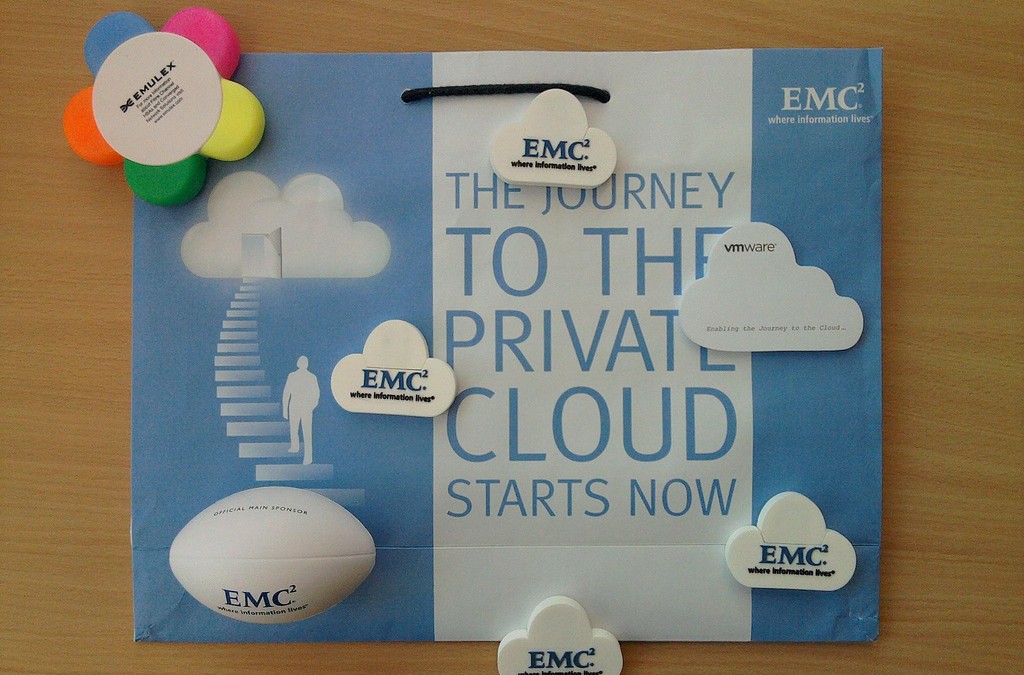Dell buys EMC and gets the corporate cloud for free

The Wall $treet Journal carried a story last week about Dell Computer possibly buying EMC, the big storage vendor, and this morning Dell confirmed it, pinning a price of $67 billion on the deal. There’s a lot to wonder about in this combination, which I think is pretty brilliant on Dell’s part even if I’m not generally in favor of mega-mergers. But it seems to me most of the experts commenting on the deal have it ass-backwards as Wall Street once again proves it doesn’t really understand technology business.
EMC has this large but aging storage division and a valuable subsidiary in VMware, of which EMC owns 80 percent. Activist investors have been rumbling that EMC should spin-off VMware to EMC shareholders because that’s the best way to realize the value of the asset and share it tax-free. Michael Dell appears as something of a white knight except he is expected, too, to get rid of VMware to finance the deal. The only thing wrong with this picture is that all the people who want to spin-off or sell VMware don’t seem to realize that’s where the value of this EMC deal lies for Dell.
It’s as simple as this: if Dell owns VMWare everyone else who makes servers for VMWare will be contributing to Dell’s profits. If Dell chooses to get into the cloud, by owning VMWare it could become a powerhouse in the industry with a price advantage no one else can match. Most of the corporate world is on VMWare and that market needs a VMWare based cloud. It doesn’t exist today because of the software cost of VMWare. Dell could fix that…. but only for itself.
And EMC is no slouch. It is a big maker of storage and is making inroads against IBM. It has a disk based backup (Data Domain) and IBM doesn’t. It has a great NAS product (Isilon) and IBM ended its partnership with NetApp. EMC will put Dell in many new corporations which could help its PC and server businesses, too.
The big loser in this is HP. IBM will be hurt, too, especially in the cloud and storage businesses.
The key differential between Dell and those other two companies is Dell is privately held and therefore immune to activist investors or -- for that matter -- any investors at all who aren’t Silver Lake Partners or Michael Dell, himself.
IBM’s storage products have been really constrained by the company’s now derailed quest for $20 EPS. IBM has neglected this business for years and it is hurting sales. EMC has under-invested in its business, too, because of Wall Street pressures. But Dell being privately owned changes that. This deal could be very good for EMC’s products and very bad for IBM’s.
Ironically, both IBM and HP could have bought EMC but walked away. Big mistakes.
Whoever owns VMWare next could control and own the future of the cloud.
The way I am writing suggests the deal isn’t sealed and something could still happen to take EMC away from Dell. That would be smart. Several companies would be wise to try grabbing EMC away from Dell but I don’t think that will happen.
What if a Chinese or Indian firm stepped in and bought EMC? The USA has already pretty much screwed up its IT industry. If ownership of EMC left the USA that could be the tipping point where the USA loses its position in the technology part of IT. It would be like the electronics industry in the 1960’s when everything went to Asia.
It is interesting to hear all the financial press chatter on this story. They’re still following the default thinking -- buy EMC, spin off and sell VMWare to make the acquisition better financially. They’re even discussing how to do it with the least tax implications. What they are not thinking about is the possibility of a bidding war for VMWare. It is equally likely someone would buy the whole company and spin off EMC.
Next column: Now what will Dell do with EMC?